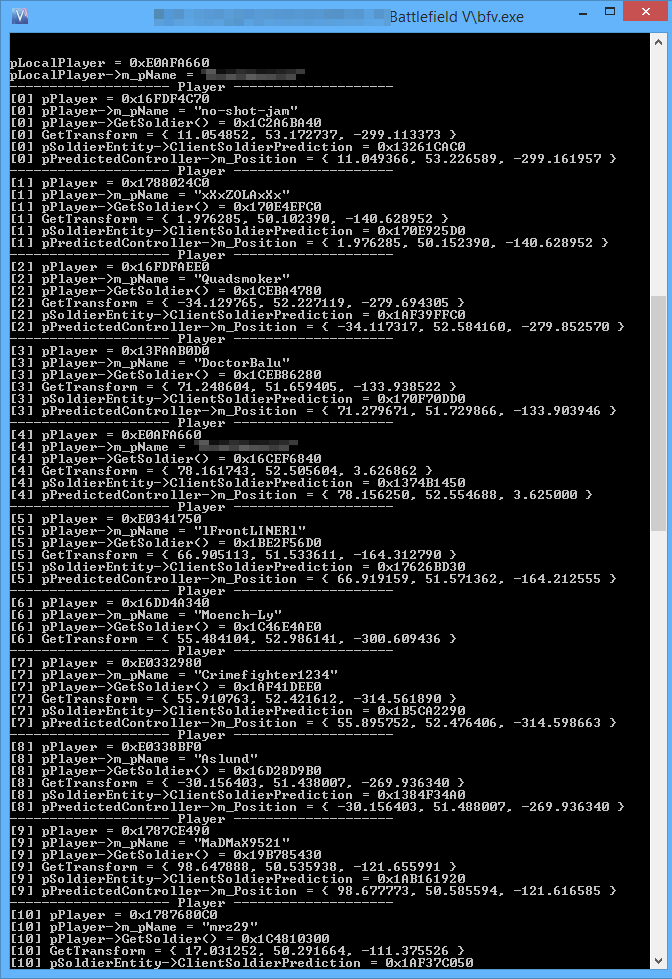Starting in Battlefield 1 the game developer started to encrypt stuff.
This demo project will show how player-list and pointer decryption can be done.
This is based on information that I reverse engineered from the game.
For decryption the game uses the so-called "DispDispReqMessage" message which also serves the purpose of "hiding" the actual decryption routines.
The decryption can also be done from an external program that is running in a different process with this method.
So its 2019 if you still use a shitty external in c# you can do the following:
https://github.com/Speedi13/BFV-Decryption/blob/master/BfvDecryptionDemo/ObfuscationMgr.cpp#L81
fb::ClientPlayer* GetPlayerById( int id )
{
_QWORD pObfuscationMgr = *(_QWORD*)OFFSET_ObfuscationMgr;
if (!ValidPointer(pObfuscationMgr)) return nullptr;
_QWORD PlayerListXorValue = *(_QWORD*)( (_QWORD)pPlayerManager + 0xF8 );
_QWORD PlayerListKey = PlayerListXorValue ^ *(_QWORD *)(pObfuscationMgr + 0xE0 );
hashtable<_QWORD>* table = (hashtable<_QWORD>*)(pObfuscationMgr + 8 + 8);
hashtable_iterator<_QWORD> iterator = {0};
hashtable_find(table, &iterator, PlayerListKey);
if ( iterator.mpNode == table->mpBucketArray[table->mnBucketCount] )
return nullptr;
if (!ValidPointer(iterator.mpNode)) return nullptr;
_QWORD EncryptedPlayerMgr = (_QWORD)iterator.mpNode->mValue.second;
if (!ValidPointer(EncryptedPlayerMgr)) return nullptr;
_DWORD MaxPlayerCount = *(_DWORD *)(EncryptedPlayerMgr + 0x18);
if( MaxPlayerCount != 70u || MaxPlayerCount <= (unsigned int)(id) ) return nullptr;
return EncryptedPlayerMgr__GetPlayer( EncryptedPlayerMgr, id );
}
fb::ClientPlayer* EncryptedPlayerMgr__GetPlayer( QWORD EncryptedPlayerMgr, int id )
{
_QWORD XorValue1 = *(_QWORD *)(EncryptedPlayerMgr + 0x20) ^ *(_QWORD *)(EncryptedPlayerMgr + 8);
_QWORD XorValue2 = PointerXor( *(_QWORD *)(EncryptedPlayerMgr + 0x28), *(_QWORD *)(EncryptedPlayerMgr + 0x10) );
_QWORD Player = XorValue1 ^ *(_QWORD *)( XorValue2 + 8 * id);
return (fb::ClientPlayer*)Player;
}
__int64 __fastcall PointerXorMultiplayer(__int64 ValueToXor /*RCX*/, __int64 EncryptedBuffer /*RDX*/, __int64 EncryptedDeviceContext /*R8*/ )
{
__int64 XorD3D11 = 0xAB541E6F771275BCui64;
ID3D11DeviceContext* pDeviceContext = (ID3D11DeviceContext*)( EncryptedDeviceContext ^ XorD3D11 );
ID3D11Buffer* pBuffer = (ID3D11Buffer*)( EncryptedBuffer ^ XorD3D11 );
D3D11_MAPPED_SUBRESOURCE MappedSubResource = {0};
HRESULT hResult = pDeviceContext->Map( pBuffer, NULL, D3D11_MAP_READ, NULL, &MappedSubResource );
if ( !SUCCEEDED(hResult) || !MappedSubResource.pData )
return ValueToXor;
__int64 XorKey = *(__int64 *)MappedSubResource.pData;
pDeviceContext->Unmap( pBuffer, NULL );
return ValueToXor ^ XorKey;
}
__int64 __fastcall PointerXorSinglePlayer(__int64 RCX )
{
return RCX ^ 0x598447EFD7A36912i64;
}
_QWORD __fastcall PointerXor(_QWORD RCX, _QWORD RDX)
{
//original function code from sub_1415780F0
//RAX = ( *(_QWORD *)(RCX + 0xD8) ^ *(_QWORD *)(RCX + 0xF8) )
//RCX = RDX
//RDX = *(_QWORD *)(RCX + 0x100)
//R8 = *(_QWORD *)(RCX + 0x108)
//jmp RAX
_QWORD pObfuscationMgr = RCX - 8;
_QWORD EncryptedBuffer = *(_QWORD *)(pObfuscationMgr + 0x100);
_QWORD EncryptedDeviceContext = *(_QWORD *)(pObfuscationMgr + 0x108);
DWORD64 DecryptFunction = ( *(_QWORD *)(pObfuscationMgr + 0xE0) ^ *(_QWORD *)(pObfuscationMgr + 0xF8) );
//Index: 0 = singleplayer | 1 = MP
static DWORD64 DecryptionFunctions[2] = {0,0};
if ( DecryptionFunctions[0] != DecryptFunction &&
DecryptionFunctions[1] != DecryptFunction )
{
DWORD64 FncCodeAddress = (DWORD64)DecryptFunction;
if (*(BYTE*)FncCodeAddress == 0xE9)
FncCodeAddress = (DWORD64)ResolveRelativePtr( (void*)( FncCodeAddress + 1 ) );
if ( *(WORD*)FncCodeAddress == 0x44C6 ) //Singleplayer
{
DecryptionFunctions[0] = DecryptFunction;
}
else
DecryptionFunctions[1] = DecryptFunction;
}
bool IsMultiPlayerEncryption = DecryptionFunctions[1] == DecryptFunction;
if ( IsMultiPlayerEncryption != true || EncryptedBuffer == NULL || EncryptedDeviceContext == NULL )
return (_QWORD)PointerXorSinglePlayer( RDX );
return (_QWORD)PointerXorMultiplayer( RDX, EncryptedBuffer, EncryptedDeviceContext );
}The pointer key is usually the start address of the class that contains the encrypted pointer
void* DecryptPointer( DWORD64 EncryptedPtr, DWORD64 PointerKey )
{
_QWORD pObfuscationMgr = *(_QWORD*)OFFSET_ObfuscationMgr;
if (!ValidPointer(pObfuscationMgr))
return nullptr;
if ( !(EncryptedPtr & 0x8000000000000000) )
return nullptr; //invalid ptr
_QWORD hashtableKey = *(_QWORD *)(pObfuscationMgr + 0xE0 ) ^ PointerKey;
hashtable<_QWORD>* table = (hashtable<_QWORD>*)( pObfuscationMgr + 0x78 );
hashtable_iterator<_QWORD> iterator = {};
hashtable_find( table, &iterator, hashtableKey );
if ( iterator.mpNode == table->mpBucketArray[table->mnBucketCount] )
return nullptr;
if (!ValidPointer(iterator.mpNode))
return nullptr;
_QWORD EncryptionKey = NULL;
EncryptionKey = PointerXor( (_QWORD)pObfuscationMgr + 8, (_QWORD)(iterator.mpNode->mValue.second) );
EncryptionKey ^= (5 * EncryptionKey);
_QWORD DecryptedPtr = NULL;
BYTE* pDecryptedPtrBytes = (BYTE*)&DecryptedPtr;
BYTE* pEncryptedPtrBytes = (BYTE*)&EncryptedPtr;
BYTE* pKeyBytes = (BYTE*)&EncryptionKey;
for (char i = 0; i < 7; i++)
{
pDecryptedPtrBytes[i] = ( pKeyBytes[i] * 0x3B ) ^ ( pEncryptedPtrBytes[i] + pKeyBytes[i] );
EncryptionKey += 8;
}
pDecryptedPtrBytes[7] = pEncryptedPtrBytes[7];
DecryptedPtr &= ~( 0x8000000000000000 ); //to exclude the check bit
return (void*)DecryptedPtr;
}